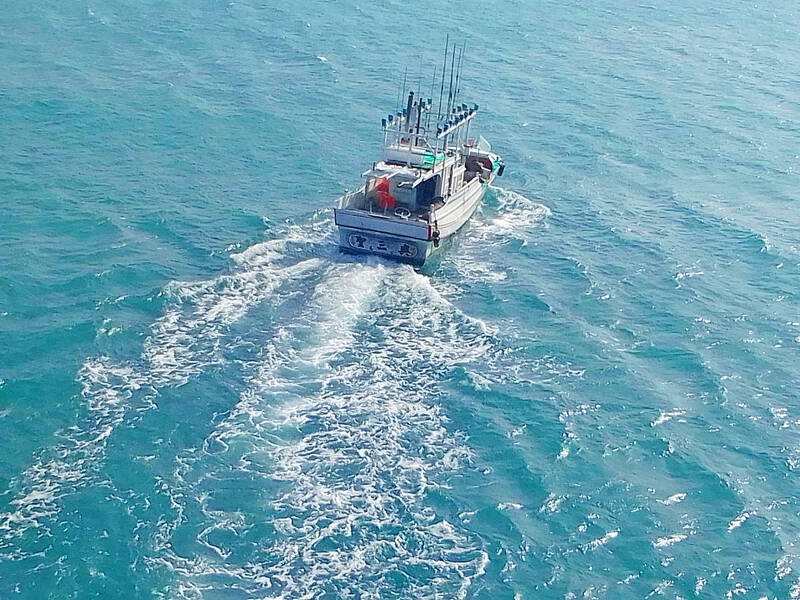The Executive Yuan yesterday approved an ocean conservation bill that would empower regulators to designate maritime sanctuaries and establish sustainable use rules, the Ocean Affairs Council said.
The draft legislation is to go to the legislature for deliberation.
The bill says that regulatory authorities would be authorized to create maritime sanctuaries consisting of core, buffer and sustainable-use zones, subject to various levels of protection.

Photo: Liu Yu-ching, Taipei Times
The core zone of a maritime sanctuary — the highest level of protection possible — would be closed to all maritime activity other than speedy passage or for activities deemed necessary to national security or science.
Aquafarming, construction, laying sea cables, mining and other economic activities in buffer zones and sustainable use zones may be permitted with central and local regulatory approval.
The central government may designate a maritime sanctuary with the approval of an evaluation committee consisting of officials, experts and representatives of civil associations, while no more than half of the committee’s members can be government officials, the bill says.
Entering a core zone without permission would carry a fine of up to NT$500,000 (US$15,911), entering a buffer zone without permission would carry a penalty of up to NT$300,000 and entering a sustainable-use zone without permission would carry a fine of NT$15,000.
The bill is expected to pass the Legislative Yuan, as the council conducted extensive consultations with experts, environmental groups and government agencies to inform its writing, council Minister Kuan Bi-ling (管碧玲) told a post-Cabinet meeting news conference.
The legislation, if passed, would give regulators a mandate to designate sanctuaries, restrict maritime activities, conduct scientific research and set ocean conservation policies, in addition to boosting protections for whistle-blowers and the public’s right to sue polluters, Kuan said.
Also yesterday, the Executive Yuan approved amendments to the Distant Waters Fisheries Act (遠洋漁業條例) in a bid to stop imports of catches and seafood products from illegal, underreported and underregulated (IUU) fishing.
The proposed changes would empower regulators to impose a partial or total ban on seafood imports from nations or regions that engage in IUU fishing, Ministry of Agriculture officials told the news conference.
Importers that contravene the ban would face a fine of NT$6 million to NT$30 million, which is the same as the penalty for domestic IUU fishers, the officials said.
Taiwan is committed to fighting IUU fishing and upholding sustainable use of the sea in partnership with the international community, they said, adding that the amendments would help law-abiding fishers and importers.

Chinese Nationalist Party (KMT) Chairman Eric Chu (朱立倫), spokeswoman Yang Chih-yu (楊智伃) and Legislator Hsieh Lung-chieh (謝龍介) would be summoned by police for questioning for leading an illegal assembly on Thursday evening last week, Minister of the Interior Liu Shyh-fang (劉世芳) said today. The three KMT officials led an assembly outside the Taipei City Prosecutors’ Office, a restricted area where public assembly is not allowed, protesting the questioning of several KMT staff and searches of KMT headquarters and offices in a recall petition forgery case. Chu, Yang and Hsieh are all suspected of contravening the Assembly and Parade Act (集會遊行法) by holding

PRAISE: Japanese visitor Takashi Kubota said the Taiwanese temple architecture images showcased in the AI Art Gallery were the most impressive displays he saw Taiwan does not have an official pavilion at the World Expo in Osaka, Japan, because of its diplomatic predicament, but the government-backed Tech World pavilion is drawing interest with its unique recreations of works by Taiwanese artists. The pavilion features an artificial intelligence (AI)-based art gallery showcasing works of famous Taiwanese artists from the Japanese colonial period using innovative technologies. Among its main simulated displays are Eastern gouache paintings by Chen Chin (陳進), Lin Yu-shan (林玉山) and Kuo Hsueh-hu (郭雪湖), who were the three young Taiwanese painters selected for the East Asian Painting exhibition in 1927. Gouache is a water-based

Taiwan would welcome the return of Honduras as a diplomatic ally if its next president decides to make such a move, Minister of Foreign Affairs Lin Chia-lung (林佳龍) said yesterday. “Of course, we would welcome Honduras if they want to restore diplomatic ties with Taiwan after their elections,” Lin said at a meeting of the legislature’s Foreign Affairs and National Defense Committee, when asked to comment on statements made by two of the three Honduran presidential candidates during the presidential campaign in the Central American country. Taiwan is paying close attention to the region as a whole in the wake of a

OFF-TARGET: More than 30,000 participants were expected to take part in the Games next month, but only 6,550 foreign and 19,400 Taiwanese athletes have registered Taipei city councilors yesterday blasted the organizers of next month’s World Masters Games over sudden timetable and venue changes, which they said have caused thousands of participants to back out of the international sporting event, among other organizational issues. They also cited visa delays and political interference by China as reasons many foreign athletes are requesting refunds for the event, to be held from May 17 to 30. Jointly organized by the Taipei and New Taipei City governments, the games have been rocked by numerous controversies since preparations began in 2020. Taipei City Councilor Lin Yen-feng (林延鳳) said yesterday that new measures by